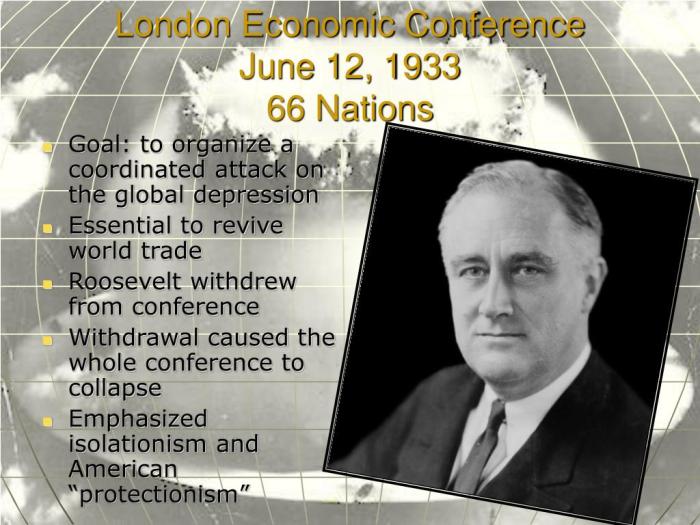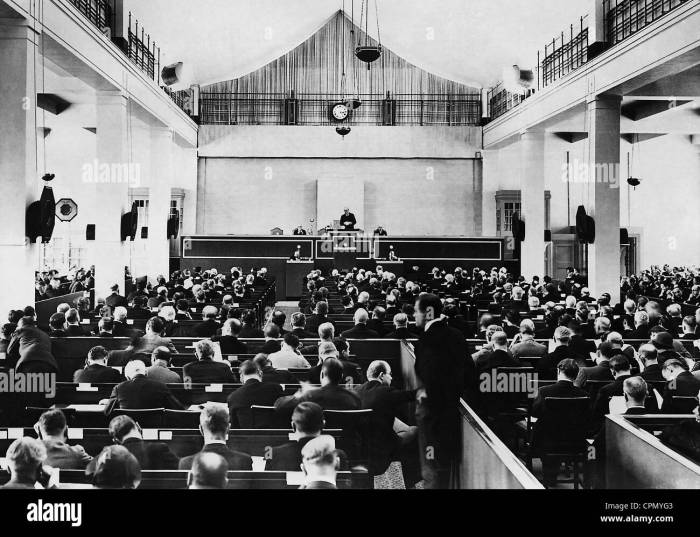The London Economic Conference APUSH definition delves into the intricate details of a pivotal international gathering that sought to address the pressing economic challenges of its time. This conference, held in 1933 amidst the Great Depression, brought together key players from around the world to negotiate and debate potential solutions to the global economic crisis.
The conference aimed to stabilize international currencies, reduce trade barriers, and promote economic cooperation. However, differing perspectives and national interests made it challenging to reach a consensus on many of the issues discussed.
Historical Context: London Economic Conference Apush Definition

The London Economic Conference was held in 1933 in response to the Great Depression, which had caused widespread economic and political instability around the world. The conference was aimed at addressing the underlying causes of the Depression and promoting international cooperation to restore economic growth.
Key Participants, London economic conference apush definition
The conference was attended by representatives from 66 countries, including the United States, the United Kingdom, France, Germany, and Japan. The major players were the United States, represented by President Franklin D. Roosevelt, and the United Kingdom, represented by Prime Minister Ramsay MacDonald.
Key Issues
The conference discussed a wide range of economic issues, including currency stabilization, trade barriers, and war debts. The United States advocated for a reduction in tariffs and the stabilization of exchange rates, while the United Kingdom and France were more cautious about these measures.
Outcomes
The conference failed to reach any major agreements on its key issues. The United States refused to agree to a stabilization of the dollar, and the United Kingdom and France refused to reduce their tariffs. As a result, the conference was widely seen as a failure.
Impact
Despite its failure to achieve its objectives, the London Economic Conference had a significant impact on international relations. It helped to raise awareness of the global nature of the Depression and the need for international cooperation to address it. It also helped to lay the groundwork for the Bretton Woods Conference in 1944, which established the International Monetary Fund and the World Bank.
Comparisons
The London Economic Conference can be compared to other international conferences that have been held to address economic crises, such as the Genoa Conference of 1922 and the Bretton Woods Conference of 1944. Like the London Economic Conference, these conferences were all held in response to major economic crises and aimed to promote international cooperation to restore economic growth.
However, the London Economic Conference was unique in that it was the first conference to bring together representatives from so many countries.
Historiography
Historians have debated the significance of the London Economic Conference for decades. Some historians have argued that the conference was a failure because it failed to achieve its objectives. Others have argued that the conference was a success because it helped to raise awareness of the global nature of the Depression and the need for international cooperation.
The debate over the significance of the London Economic Conference is likely to continue for many years to come.
General Inquiries
What was the primary goal of the London Economic Conference?
The primary goal of the London Economic Conference was to address the global economic crisis caused by the Great Depression and to promote international economic cooperation.
Which countries were the major participants in the conference?
The major participants in the conference included the United States, Great Britain, France, Germany, Italy, and Japan.
What were the key economic issues discussed at the conference?
The key economic issues discussed at the conference included currency stabilization, trade barriers, and international debt.


